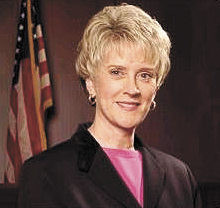Chief justice takes steps to heed Hispanic Bar’s demands
By Linda Bentley | November 12, 2008
Courts urged to avoid ‘hurtful’ terms ‘illegals’ and ‘aliens’
PHOENIX – Last week, Judicial Watch posted a short item on its Corruption Chronicles Blog titled, “Judge bans use of ‘illegals’ and ‘aliens.’”
 On Sept. 12, Los Abogados (The Lawyers) Hispanic Bar Association President Lizzette Alameda Zubey wrote a letter to Arizona Supreme Court Chief Justice Ruth V. McGregor requesting her “assistance in disseminating some important information to Arizona’s judges and their staff.”
On Sept. 12, Los Abogados (The Lawyers) Hispanic Bar Association President Lizzette Alameda Zubey wrote a letter to Arizona Supreme Court Chief Justice Ruth V. McGregor requesting her “assistance in disseminating some important information to Arizona’s judges and their staff.”
Zubey asked, specifically, that McGregor “strongly encourage” judges and their employees to avoid using “certain inflammatory immigrant-related terms in court documents, correspondence and proceedings.”
By eliminating these “unnecessary terms” from public documents and proceedings, that attach an “illegal status” to aliens in the country illegally, Zubey claimed it would “increase the professionalism of the courts, reduce perceptions of judicial bias and lead to greater confidence in Arizona’s courts.”
Zubey refers to the terms as being “provocative,” “pejorative” and “hurtful.”
She strongly discourages use of the words “illegals” and “aliens” to describe persons without lawful immigration status, and says the terms create division, add nothing to today’s immigration debate, give the appearance of anti-immigrant prejudice and tarnish the image of our courts.
Zubey attached lists of objectionable terms and their proposed substitutes, none of which include reference to anything being illegal.
According to Zubey, these “hurtful terms” have been roundly criticized by the National Association of Hispanic Journalists (NAHJ) “for dehumanizing a segment of the population.”
Zubey criticized the Arizona Court of Appeals for its published opinion in Hernandez v. Lynch, the legal challenge to Proposition 100, denying bail to illegal aliens who commit serious crimes, because it quoted Rep. Russell Pearce, R-Mesa, saying “illegals” and “illegal aliens.”
Stating “alien(s)” is “pejorative” and “alternatives should always be sought,” Zubey allowed for exceptions when quoting statutory language, but added, “Even so, the evolving meaning and impact of certain historical words require a periodic reevaluation.”
The day after posting the story on its Corruption Chronicles Blog, Judicial Watch received a phone call from an Arizona Supreme Court spokesperson who denied McGregor banned anything and threatened to sue Judicial Watch for “slander.”
Judicial Watch said it stands by its story, citing McGregor essentially agreed to Los Abogados’ demands by “asking that our judges and employees refrain from using certain derogatory terms in court documents and proceedings.”
Judicial Watch also posted a link to McGregor’s response thanking Los Abogados for its letter “asking that our judges and employees refrain from using certain derogatory terms in court documents and proceedings. I have taken several steps to notify our judges of your concerns.”
In addition to noting all superior court presiding judges would be provided a copy during their scheduled meeting on Oct. 21, McGregor said she asked the Commission on Minorities in the Judiciary (COM) to consider whether further distribution would be helpful.
 A report titled “Immigration, Cultural Competency and the Courts – A trial Court’s Perspective,” recently produced by Maricopa County Superior Court Grants and Specialty Courts Coordinator Robin Hoskins and Court Planning, Policy and Management Consultant John A. Martin, opens with, “Ongoing immigration to the United States, along with increasing home-grown demographic diversity within our society, have dramatically increased the need for courts to become more culturally competent ...”
A report titled “Immigration, Cultural Competency and the Courts – A trial Court’s Perspective,” recently produced by Maricopa County Superior Court Grants and Specialty Courts Coordinator Robin Hoskins and Court Planning, Policy and Management Consultant John A. Martin, opens with, “Ongoing immigration to the United States, along with increasing home-grown demographic diversity within our society, have dramatically increased the need for courts to become more culturally competent ...”
While Maricopa County Superior Court has utilized Martin’s consulting services for the past few years “to become a more culturally competent court,” Maricopa County Attorney Andrew Thomas recently appeared before the Ninth Circuit Court of Appeals to challenge race-based (culturally competent) DUI courts, arguing the courts violate the Constitution and are “morally offensive.”
On Sept. 15, 2008, the California Court of Appeals for Yolo County issued an opinion certified for partial publication in Martinez v. Regents of the University of California, in which Judge Richard M. Sims, III, wrote, “Defendants prefer the term ‘undocumented immigrants.’
However, defendants do not cite any authoritative definition of the term and do not support their assertion that the terms ‘undocumented immigrant’ and ‘illegal alien’ are interchangeable. We consider the term ‘illegal alien’ less ambiguous. Thus, under federal law, an ‘alien’ is ‘any person not a citizen or national of the United States.’”
In March 2006, the NAHJ issued a policy paper urging the news media to stop using “dehumanizing terms when covering immigration.” In it the organization called for stopping use of “illegals” as a noun and curbing the phrase “illegal alien.”
The opening paragraph stated, “As protestors march in the streets … the NAHJ calls on our nation’s news media to use accurate terminology in its coverage of immigration and to stop dehumanizing undocumented immigrants.”
Although the NAHJ concurred “alien,” as defined by Webster’s Dictionary, was in accordance with the U.S. government’s interpretation to describe a foreign-born person who is not a citizen, it said the dictionary also included “other, darker meanings for the word.”
The NAHJ said the term “illegal immigrant” should be avoided and use alternative terms such as “undocumented worker” or “undocumented immigrant.”
“Undocumented immigrant” was the preferred term for people “who do not have the federal documentation to show they are legally entitled to work, visit or live here” with the claim that “some Latinos say this term more accurately describes people who are in the United States illegally because the word points out that they are undocumented, but does not dehumanize them ...”
The Asian American Journalists Association (AAJA) also has stylebook preferences “to promote fair and accurate coverage of Asians in America and highlight the community’s diversity …”
While AAJA cautions use of the term “immigrant,” can be a racially or ethnically charged term under certain circumstances and notes the “status of undocumented workers is another issue and should be discussed carefully both with the source and editors, as to the risks of deportation,” it does not list “aliens,” “illegals” or “illegal aliens” as terms deemed offensive.
The National Association of Black Journalists’ (NABJ) stylebook lists the word “alien” and states, “A term for a foreigner or an immigrant that often conveys overtones of menace or strangeness. Avoid its use in copy or headlines. The preferred term for those who enter a country in violation of the law is illegal immigrants or undocumented immigrants.”
Apparently the NABJ also does not consider the term “illegal immigrant” offensive.
Top photo: Ruth V. McGregor
Lower photo: Lizzette Alameda Zubey
Courtesy photos
